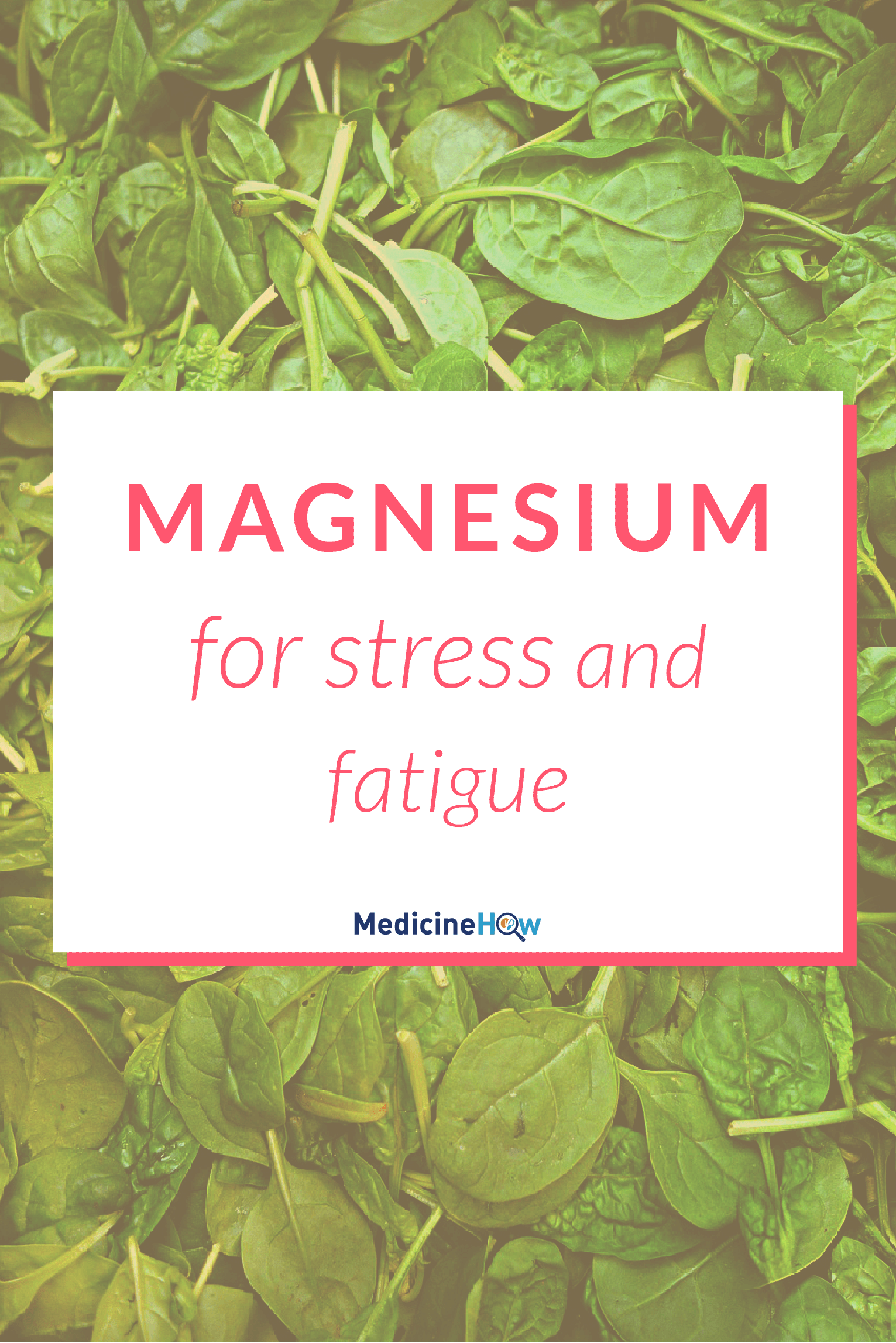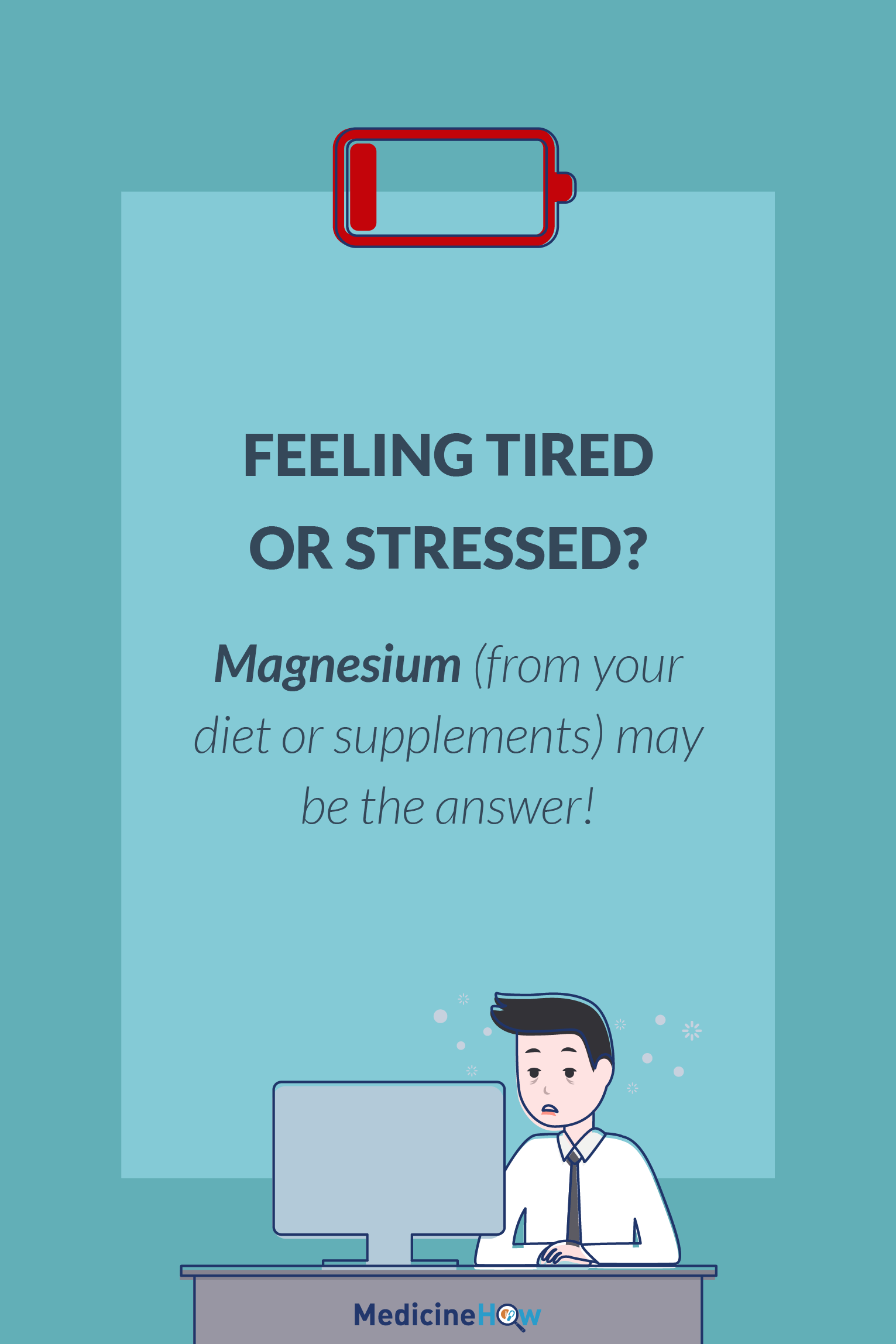
Are you feeling tired and stressed? With today’s bustling pace of life, many people feel under the weather with everything they need to do. Would magnesium supplements help?
Ideally, we’d take a good look at our lifestyle and think about what’s truly necessary. Do we need to be doing all of those “extra” things? Is there some way we can carve out some free time to just relax?
There’s no doubt this is a difficult task. Parents are often working full-time, in addition to doing their best in raising a family. Students need to work whilst studying to pay the bills and free time seems to be an elusive word.
Sometimes, we just can’t find a place in our lives to wind down and let our stress out. And this, of course, wears you down until you become a tightly wound ball of stress and fatigue.
What can you do?
Well, other than making drastic changes to your lifestyle, you can think a little bit about how you are feeding your body. Are you giving it the nutrients it needs to cope with the daily stresses and exhaustion of your lifestyle? Maybe you should be.
Magnesium is a mineral that it is important for us to consume in our diet. One of it’s many properties is to help in the relief of tiredness and stress. At least, that’s what it is usually marketed for.
Does increasing your intake of magnesium really work to make you feel more revitalised? And how can we naturally include more magnesium in our diet?
Let’s take a look.
What is magnesium?
 Magnesium is a mineral that is essential for the normal function of your body that you can usually get from your diet.
Magnesium is a mineral that is essential for the normal function of your body that you can usually get from your diet.
Deficiency in magnesium is particularly common in developed countries because the western diet usually contains high proportions of grain products, which are not good sources of the mineral. Foods that do contain more magnesium – like leafy vegetables and nuts – are not a large part of the diet and another reason why deficiency is common.
People that are deficient in magnesium might notice symptoms such as increased blood pressure and excitation of the nervous system, and they are also at an increased risk of diabetes. Increasing the amount of magnesium in your diet – or using a supplement – may help to improve symptoms if you are deficient in magnesium.
This is a great resource if you’d like to know more about magnesium and its health effects on the body.
About stress and fatigue
Stress is a big problem for many people and can occur in various different situations. It might be due to malnutrition, a surgical procedure, mental or emotional strain, or excessive exercise. Anything that puts pressure on your body to perform can lead to a stress response.
Unfortunately, stress is not healthy for your body. Even just from personal experience, you probably know the effect stress can have on your health, but the concept is firmly supported by scientific research as well. If you’d like to read more about the health effects of stress, read this article about stress, anxiety and sleep abnormalities. It’s responsible for the majority of visits to doctors and is known to cause headaches, heart disease, immune deficiencies and digestive problems, along with a host of other health conditions.
When your body is stressed, it starts to produce and release stress hormones, epinephrine and norepinephrine, into your bloodstream. These hormones affect our body in a number of ways to cope with the stress, including the release of another hormone called cortisol, which is important in the regulation of sleep and stress. Levels of cortisol naturally rise and fall throughout the day, forming a pattern called circadian rhythm that helps us to sleep and wake up.
When your body is subjected to stress, it doesn’t recover straight away. This study showed that stress has continued effects on the body and people exerting physical stress may need longer than 5 days of complete rest for their circadian rhythm of cortisol to return to normal.
People with high levels stress are likely to:
- Feel angry or irritable
- Have difficulty sleeping at night
- Feel tired
- Eat more, particularly unhealthy food
- Skip meals
It is quite clear that stress and fatigue are closely linked. Stress hormones cause changes in the hormones that help to regulate your sleep. You then have difficulty sleeping and feel tired during the day, leading to a poorer response to stressful situations. It’s definitely not a good cycle. This article explains exactly why stress can lead to cardiovascular disease and decreased immune function, meaning you will be more likely to get sick more often.
How does it work for stress?
When magnesium is absorbed by your body it can have an effect on the neurotransmitters in your brain and change the way messages get passed on. When magnesium levels are low, this study has shown that neuronal excitation tends to happen randomly and too much in the brain of rats. With sufficient magnesium, these messages become clearer and normal neuronal excitation helps to reduce excess messages within the brain and stress. This study looks at the behavioural effects of magnesium supplementation on mice and showed that magnesium can have a stimulant effect on the nervous system, due to the way it interacts with neurotransmitters in the brain.
Cortisol is sometimes referred to as the “stress hormone” because it is often present when people are stressed – or rather, because people are stressed. This study specifically looks at the levels of cortisone levels after taking magnesium supplements and, although it was quite small with only nine participants, everyone tested showed a drop in cortisol levels with magnesium supplementation, with no significant side effects. A decrease in cortisol is likely to help reduce stress and help regular sleeping patterns to form once again for symptoms of fatigue.
Does it have other effects?
It’s important to think about the way nutrients affect your entire body, as there might be side effects that are even worse than the initial problem. That’s why you always have to weigh up the benefits and risks of anything you fuel your body with.
When you consume magnesium, your body absorbs just the right amount from your gastrointestinal tract to keep your body functioning well. If you consume more than you need, it simply goes straight through and out the other end, which is great because excess magnesium isn’t usually a big problem. In fact, the main symptom of excess magnesium is diarrhoea, to help you excrete it out of your body!
How much do you need?
The amount that you should consume each day depends on your body size and weight, gender, age and lifestyle.
- Females need approximately 255 – 265 mg of magnesium each day.
- Males need about 330 – 350 mg of magnesium daily.
For the exact values, you can see this table. It is particularly useful for special circumstances, such as when a woman is pregnant or breastfeeding when her magnesium requirements are higher than usual.
If you think you may be deficient in magnesium, you should see a doctor to discuss your options. Nutritional advice to increase your natural intake may also be a great place to start.
What the natural foods sources?
 Magnesium is a natural component of many foods, so it makes sense to make the most of this. In fact, the majority of
Magnesium is a natural component of many foods, so it makes sense to make the most of this. In fact, the majority of
people can reach their dietary requirement of magnesium simply by choosing the right foods in their daily diet.
How much magnesium is found in different foods? Check out this list:
- Spinach: 78 mg in 1/2 cup of cooked spinach
- Nuts: 63-80 mg in 30 g of almonds, cashews or peanuts
- Black beans: 60 mg in 1/2 cup of beans
- Avocado: 44 mg in 1 cup of avocado
- Potato: 43 mg in 100 g of potato
- Brown rice: 42 mg in 1/2 cup cooked rice
- Banana: 32 mg in 1 banana
There are many ways for you to increase your intake of magnesium by making small changes to your diet. Simply making an effort to eat more greenery such as spinach and opting for a small serve of nuts as a snack can go a long way!
However, some people still may struggle to get the amount of magnesium they need, and might consider taking a supplement.
Should you take a magnesium supplement?
If you feel that you need to take a supplement, you should talk to your doctor or pharmacist for more advice.
There are different types of magnesium in various supplement brands. In most cases, it doesn’t make much difference which form you opt for. However, this study found that the magnesium oxide form is not able to be absorbed by your body as well – only 4% is absorbed into your blood stream.
Other types of supplements, which are roughly the same in effectiveness, are:
- Magnesium chloride
- Magnesium lactate
- Magnesium aspartate
If you decide to take a magnesium supplement, you may like to experiment with what time of day you take it. Some people seem to experience a sedative effect from magnesium supplements – so it is best for them to take it at night before bed – whilst others become more alert so taking it in the morning makes more sense.
From a theoretical perspective, it is best to take magnesium at night before bed because the way it works in the body should make you feel tired. But practice often surprises theory and if you find taking it in the morning works better for you, by all means, do so!
Pin it!




